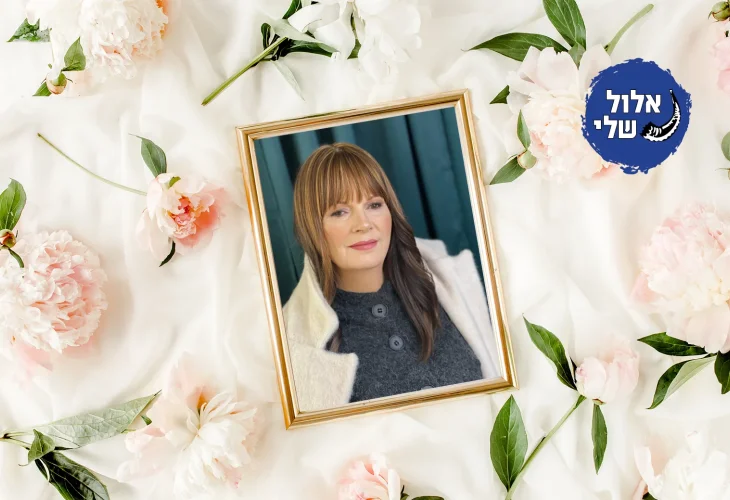A Journey of Faith: How Our Son's Illness Changed Everything
A personal story of a child's illness, seeking closeness to Hashem, heartfelt apologies, and the enduring melody of "Adon HaSelichot." An interview with Ariella Savir for "My Elul."

Getting to Know Me
"I'm Ariella Savir, 63 years old, living with my husband Jacob in the settlement of Karnei Shomron. Until 18 years ago, we lived in Safed, but during the Second Lebanon War, we wanted to provide our children with a calmer, more peaceful environment, so we moved.
"People know me from my lectures, songs, and activities, but generally, I see myself as 'Ashrei Yoshvei Veitecha Od Yehalelucha Selah,' which also begins and ends with my name in the verse. After years of performing non-stop, I now lecture only a little and occasionally give writing workshops. Additionally, in recent years, we've turned to our hobbies. My husband works with wood in his private carpentry shop, not for commercial purposes but for the soul—for the grandchildren and as beautiful gifts. I've discovered my hands and am involved in weaving, creating bags and various creations. When people ask what I'll do with my collection, I laugh and say, 'I'm saving it for an exhibition when I'm seventy.'"
Sharing Memories of My First Elul after Embracing Religion
"I experienced my first month of Elul as a ba'alat teshuva 32 years ago, shortly after we began observing mitzvot. Everything was done with trepidation and awe as we tried to learn the codes, mainly out of fear and much anxiety. It was after our son miraculously recovered from a liver disease, and I was willing to do anything so that the Creator would bless us. In those days, I didn't fully understand that Hashem doesn't 'punish' us because we're not good or 'gives gifts' because we behaved nicely. I didn't realize the relationship with Hashem is much deeper, and our responsibility is to learn the codes and understand our mission in the world.
"At that time, I found myself writing many songs, as the words and singing helped me articulate myself, and explain to myself and those around that all our actions are weighed, both heavy and light, and everything is seen and known before Hashem. I wrote and composed songs connected to Elul and Rosh Hashanah, and this helped me find balance. Incidentally, if we split the word 'balance' in Hebrew, we get the phrases 'this is me' and 'isn't it.' So if you wish to be balanced, it's not an impossible task; you only need to strive and pray for it.
"It moves me to remember that month of Elul, as it was unforgettable. I went through a process that allowed me to know Hashem from a healthy and correct place—not just out of fear but also out of love. I learned to serve Him with my inner balance and crown Him anew at every moment. As a result of that month of Elul, I not only observed mitzvot but also paid more attention to details, striving to make the process stable and strong."
A Piyyut or Song of the High Holy Days You Connect With?
"'Adon HaSelichot... Chatanu Lefanecha.' Such simple words that I remember from my parents' home. To this day, when I'm kneading dough and hear this piyyut in the background, I hear my mother's soprano voice singing. Since then, I've heard so many cantors sing this piyyut in synagogues, but for me, it will always remind me of my mother."
Your Greatest Insight from the Past Year?
"Following the Sword of Iron War with so much chaos in the country, I feel more than ever the verse: 'The wise will remain silent now,' and I strive to be as wise as possible. I try to avoid arguments and taking sides, preferring to sit and wait for salvation. If we consider it, the letters of the word 'wait' in Hebrew form the word 'wisdom.' The wise know the best thing to do is simply wait for the Messiah, redemption, salvation, miracles, and the signs Hashem gives us at every moment."
Advice for Those Beginning Their Journey Back to Faith?
"After a few decades have passed since I returned to faith, I know the most important thing is to have a 'model'—someone you can aspire to be like and consult with when needed. It doesn't necessarily have to be a rabbi; a good friend or any other mentor will do. Additionally, avoid aiming too high, as it's very dangerous and yields poor results. Most importantly, strive to continuously advance by attending classes, showing interest, exposing yourself, and applying what you learn, whether on your children at home or the people around you. Try to progress slowly, and avoid cutting ties with those who were once your friends just because they remain secular. As religious people, try cultivating 'baseless love.' Not 'love without cost,' but from the word 'grace'—to love the charm in others, because everyone has their points of charm."
Who Did You Last Ask Forgiveness From?
"From my friend who was sitting shiva for her husband. I asked her forgiveness for not being able to come and comfort her, even though I wanted to. The problem is that as a blind woman, I find it hard to attend places with many people, and the mourner sits so low, on the floor or a mattress, without a way for me to identify her location. It's very embarrassing and uncomfortable, so I preferred to write her a heartfelt condolence letter, ending with an apology."
Finally, What Do You Wish for the New Year?
"I want to wish our people that we merit to see salvation soon, with many good news, salvations, and comfort. May we all do only good and learn to love Hashem, continually crowning Him."

